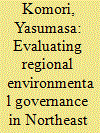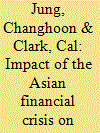| Srl | Item |
| 1 |
ID:
096154


|
|
|
|
|
| Publication |
2010.
|
| Summary/Abstract |
Since the early 1990s, many regional and subregional environmental frameworks and programs have been created in Northeast Asia. In this article, the author assesses the extent to which these schemes have translated into a higher level of environmental governance. He argues that despite remarkable institutional development, regional environmental governance is at an embryonic stage. Its weakness stems from three factors in particular: (1) the primacy of national governments and the limited role of nonstate actors, (2) the lack of a coordinating mechanism among overlapping environmental initiatives, and (3) the lack of tangible outcomes in terms of mitigating environmental degradation.
|
|
|
|
|
|
|
|
|
|
|
|
|
|
|
|
| 2 |
ID:
096155


|
|
|
|
|
| Publication |
2010.
|
| Summary/Abstract |
The Republic of Korea was one of the major victims of the Asian Financial Crisis of 1997-98, but it recovered its economic dynamism quite quickly. In the short term, its budgetary response to near economic collapse was immediate and quite significant. The government increased spending and, once the peak of the crisis was over, taxes and expanded its previously very limited support of needy Koreans by substantially increasing funds for social development and for aiding local government. Thus, despite its being forced to accept a large International Monetary Fund (IMF) loan in late 1997, Korea clearly rejected the IMF model of fiscal austerity and governmental downsizing, giving a much higher priority to the welfare of its citizens. However, this short-term response to the devastating fallout from the crisis seems to have exacerbated several long-term challenges facing Korea. The liberal fiscal policy clearly contributed to the country's burgeoning debt problem, and there have been only limited attempts to improve the problems associated with public funds and special accounts. Unfortunately, political inertia makes a serious response to these long-term challenges unlikely in the near future.
|
|
|
|
|
|
|
|
|
|
|
|
|
|
|
|